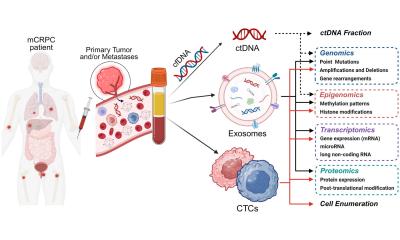News • New targetable driver of growth found
Thyroid gland: unexpected key to prostate cancer treatment
A hormone produced in the thyroid gland can play a key role in the development of prostate cancer.

Image source: MedUni Wien
This is shown in a new study by an international research group led by Umeå University, Sweden, and the Medical University of Vienna, Austria. By blocking a receptor for the hormone, the growth of tumour cells in the prostate was inhibited. In the long term, the discovery may open up a new way of attacking certain types of aggressive prostate cancer.
"The results indicate that the receptor in question is a driving force in the growth of cancer. Substances that block it could thus be a target for future drugs against prostate cancer," says Lukas Kenner, visiting professor at Umeå University and the one who has led the study that is published in Molecular Cancer.
The receptor in question is called thyroid hormone receptor Beta, TRβ. It binds the thyroid hormone triiodothyronine, T3. In laboratory experiments, the activation of T3 has led to a sharp increase in the number of prostate cancer cells. However, when the receptor TRβ was inhibited with the help of an active substance, NH-3, significantly reduced the growth of cancer cells. NH-3 is a substance that is only used in research to block TRβ.
The substance's effect on cancer was then confirmed in animal experiments in mice. Tumours treated with NH-3 remained smaller or progressed significantly more slowly. This was shown to be particularly effective in models of prostate cancer that are so-called castration resistant. This means that the tumour continues to grow despite treatment that reduces the amount of the male sex hormone testosterone, which usually drives cancer growth. This form is currently difficult to treat clinically.

Image source: Umeå University; photo: Mattias Petterson
Blocking TRβ using NH-3 worked by leading to the elimination of a particular signal, the androgen receptor signal, which is otherwise activated by testosterone and then plays a central role in the development of prostate cancer.
A review of data from cohorts of patients with prostate cancer supports these findings. In tissue samples, elevated levels of TRβ could be seen in tumours in the prostate compared to those in healthy tissue. In addition, genetic analyses show that mutations in many prostate cancer patients alter the signalling pathways for thyroid hormone. This suggests that blocking the thyroid hormone and its receptor may be a target for further research to find new treatments for prostate cancer.
"Of course, it is a balancing act not to change the hormonal balance in the thyroid gland more than necessary to fight cancer in another part of the body, and it will probably not be a solution for all types of prostate cancer. Further research will have to answer what a treatment could look like, possibly in combination with other treatments. Of course, this is an interesting track," says Lukas Kenner.
Prostate cancer is the second most common form of cancer among men in the world. When detected early, the disease is usually treated by reducing the amount of testosterone. However, many patients become resistant to this treatment, and as a result, the number of available treatments is limited.
Source: Umeå University
11.11.2025




